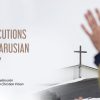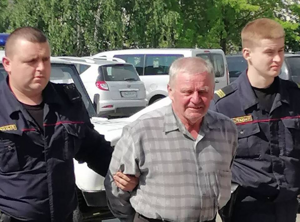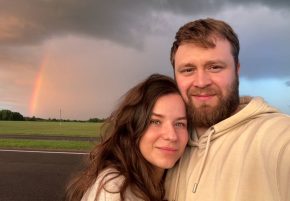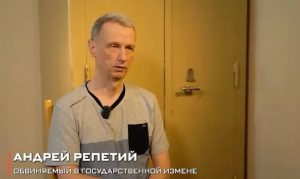Forum 18. BELARUS: Repressive draft Religion Law awaits second reading. Part 1
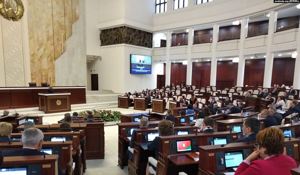

Organisation"Forum 18"
Норвежская организация, целью которой является содействие религиозной свободе.
18 October 2023
Felix Corley, Forum 18, and Olga Glace, Forum 18
Belarus’ repressive new Religion Law awaits its second reading in the regime’s non-freely elected parliament after passing its first reading on 11 October. No date has been set. The text of the draft Law as presented to parliament was made public only on about 10 October. Local human rights defenders and religious communities have criticised the Law, and three UN Special Rapporteurs have written to the regime expressing concerns that the proposed new Law “would fail to meet Belarus’ obligations under international human rights law”.
Belarus’ repressive new Religion Law reached the regime’s non-freely elected parliament on 29 September, and passed its first reading in the lower chamber, the House of Representatives, on 11 October. No date has been set for a second reading. The text of the draft Law as presented to parliament was made public only on about 10 October.

© Svaboda.org (RFE/RL)
The draft Law was assigned to the Human Rights, Ethnic Relations and the Media Commission, with deputy Lyudmila Zdorikova overseeing its adoption. Mariya Ignatenko, Zdorikova’s assistant, put the phone down without saying anything when Forum 18 asked her about the new Law (see below).
Among numerous restrictions, the draft Religion Law would (see below) among other things:
– continue to require all religious communities to gain state registration before they are allowed to operate;
– continue to ban the activity of unregistered religious organisations;
– impose compulsory re-registration within one year on all registered religious organisations, paralleling earlier demands on political parties and other public associations;
– impose even tighter registration restrictions and conditions;
– make extensive and arbitrary use of the undefined terms “extremism”, “terrorism”, and “the ideology of the Belarusian state” to justify restricting the exercise of freedom of religion or belief and related fundamental freedoms;
– continue powers for the regime to inspect and monitor religious communities;
– give greater “legal” possibilities for the regime to forcibly close religious communities;
– continue and increase censorship and restrictions on religious literature and items;
– impose new restrictions on religious education by religious communities;
– aim to separate religious communities from involvement with wider society;
– and impose new restrictions on religious charitable activity, allowing no religious organisations except monasteries from running children’s homes (see below).
“We look at the new law with caution,” a Protestant pastor who asked not to be identified for fear of state reprisals told Forum 18. “It promises nothing good, but it depends on how formally it will be applied as the wording in some parts is obscure.” The pastor noted the “endlessly expanding” list of reasons the state could use to liquidate religious communities. “If desired, they may be applied to any religious organisation” (see below).
The Head of the Baptist Union, Leonid Mikhovich, said their “main concern” was the requirement to have 20 founders for registering a religious community. “In some villages we do not have the required number of people, while the law provides no other option other than to have 20 people to be allowed to hold regular worship meetings,” he told Forum 18 (see below).
“Many of our communities will fail the state re-registration, mostly those in the countryside where there are not many people,” a member of the Religious Board of Muslims in Belarus, who asked not to be identified for fear of state reprisals, told Forum 18. “There is also a risk that our religious association, the Muftiate, will not have enough member communities for registration” (see below).
A member of the Minsk community of the Church of Jesus Christ of Latter-day Saints (commonly known as the Mormons), who asked not to be identified for fear of state reprisals, also expressed concern about re-registration. “Some of our believers might feel uneasy to disclose their personal information, which is demanded at re-registration,” the individual told Forum 18. “Many communities rent buildings for worship, while others cannot find any and have to meet online” (see below).
Independent news website Zerkalo (working in exile as the regime has banned it as “extremist”) noted the new restrictions and requirement for all registered religious organisations to undergo re-registration. “Earlier this year, all opposition parties were liquidated in this manner,” Zerkalo noted. “Apparently, having ‘cleaned up’ most spheres of public life, the authorities finally got round to religion and decided not to limit themselves to targeted measures like arresting ‘wrong’ priests, so now there will also be fewer churches” (see below).
On 28 August, three United Nations (UN) Special Rapporteurs – Anaïs Marin (Special Rapporteur on the situation of human rights in Belarus), Clément Nyaletsossi Voule (Special Rapporteur on the rights to freedom of peaceful assembly and of association), and Nazila Ghanea (Special Rapporteur on freedom of religion or belief) – wrote to the regime expressing concerns that provisions in the proposed new Law “would fail to meet Belarus’ obligations under international human rights law” (see below).
The three Special Rapporteurs express specific concerns about: mandatory state registration; compulsory re-registration; tighter registration restrictions and conditions; increased monitoring and surveillance of religious organisations; restrictions on religious literature and items; monitoring and inspection of religious organisations; expansion of legal grounds allowing state authorities to dissolve religious organisations; and new restrictions on religious charitable activity (see below).
The three Special Rapporteurs also note that: “In 2020, Belarus also supported a recommendation during the Universal Periodic Review to ensure that no restrictions are imposed on the right to freedom of religion and belief.” The Rapporteurs urged the regime to “review and reconsider certain key aspects of the law to ensure that it complies with Belarus’ international human rights law obligations.” They urged the regime not to “rush the process” of adopting the draft Law (see below).
Short timescale, civil society punished for attempts to improve existing Law
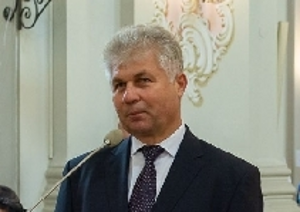
© Viktar Vedzen/Catholic.by
The regime announced in a 30 December 2022 Decree by Aleksandr Lukashenko that it was going to pass a new Religion Law, to be prepared by June 2023 and reach the Parliament in September. As of 11 May 2023, no text had been published and regime officials persistently refused to give any comments or information on the amendments to religious leaders and human right defenders.
No election in Belarus has been found to be free and fair by Organisation for Security and Co-operation in Europe (OSCE) election observers, and the regime violently repressed nationwide protests against election fraud.
On 2 June, the regime published a draft of the proposed new Religion Law prepared by the Plenipotentiary for Religious and Ethnic Affairs Aleksandr Rumak. The regime claimed the draft Law was open for public comments from 5 to 15 June. The Minsk-based Lawtrend Centre for Legal Transformation criticised the short time allowed for public comments, despite the “exceptional significance of the draft Law for religious and social life”.
The new Law is set to replace and harshen the highly restrictive 2002 Religion Law. Multiple civil society and Catholic, Orthodox, and Protestant attempts after 2002 to change this Law, including a petition signed by over 50,000 people, were rejected by the regime and the organisers punished.
On 28 August 2023, three United Nations (UN) Special Rapporteurs – Anaïs Marin (Special Rapporteur on the situation of human rights in Belarus), Clément Nyaletsossi Voule (Special Rapporteur on the rights to freedom of peaceful assembly and of association), and Nazila Ghanea (Special Rapporteur on freedom of religion or belief) – wrote to the regime expressing concerns that provisions in the proposed new Law “would fail to meet Belarus’ obligations under international human rights law”.
The Rapporteurs urged the regime to “review and reconsider certain key aspects of the law to ensure that it complies with Belarus’ international human rights law obligations”. They urged the regime not to “rush the process” of adopting the draft Law.
Justifying the new restrictions
In Plenipotentiary for Religious and Ethnic Affairs Rumak’s justification of the alleged need for the new Law, published on 2 June alongside the draft, he claimed that the 2002 Religion Law needs to be brought into line with the Constitution, as well as the “strengthening on the legislative level of new contemporary approaches in mutual relations between the state and religious communities”. He did not explain what these approaches are.
However, Plenipotentiary Rumak stated that in preparing the 2023 Law, the regime took account of various other Belarusian laws, as well as the Religion Laws of Russia, Kazakhstan, Tajikistan, Uzbekistan, Kyrgyzstan and Azerbaijan. All these Religion Laws have been strongly criticised by human rights defenders for not complying with legally-binding international human rights obligations.
Plenipotentiary Rumak stated in his June justification for the Law that the regime wants, among other things, to: prevent officials from using their official position to influence people over their religious views; to ban religious communities from using any symbols apart from religious symbols; to ban the use of texts and images inciting religious discord and hatred; and ban “the activity of religious communities directed against the sovereignty of the Republic of Belarus, its constitutional system and civic accord”.
Plenipotentiary Rumak also stressed what he sees as the need to “correct” the 2002 Religion Law’s preamble to recognise the “special role” of the pro-regime Belarusian Orthodox Church (of the Moscow Patriarchate) in the “historical establishment and development of spiritual, cultural and state traditions of the Belarusian people, as well as the inseparability from the general history of the people of Belarus of other Christian, Jewish and Islamic religious communities”.
In the preamble to the draft Law made public on 2 June the Lutheran Church was not specifically mentioned, unlike in the 2002 Religion Law, and was replaced by a general “other Christian” category. However, the draft presented to parliament in September 2023 now includes the Lutheran Church, removing any reference to “other Christians”.
Regime claims draft Law “does not affect” international human rights obligations
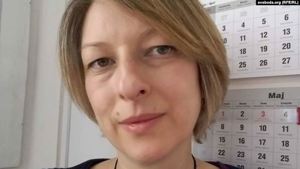
© Svaboda.org (RFE/RL)
On 28 August 2023, three United Nations (UN) Special Rapporteurs – Anaïs Marin (Special Rapporteur on the situation of human rights in Belarus), Clément Nyaletsossi Voule (Special Rapporteur on the rights to freedom of peaceful assembly and of association), and Nazila Ghanea (Special Rapporteur on freedom of religion or belief) – wrote to the regime expressing concerns that provisions in the proposed new Law “would fail to meet Belarus’ obligations under international human rights law”.
They express specific concerns about: mandatory state registration; compulsory re-registration; tighter registration restrictions and conditions; increased monitoring and surveillance of religious organisations; restrictions on religious literature and items; monitoring and inspection of religious organisations; expansion of legal grounds allowing state authorities to dissolve religious organisations; and new restrictions on religious charitable activity.
The three Special Rapporteurs note: “In 2020, Belarus also supported a recommendation during the Universal Periodic Review to ensure that no restrictions are imposed on the right to freedom of religion and belief (A/HRC/46/5 para. 138.153).”
The Special Rapporteurs urged the regime to “review and reconsider certain key aspects of the law to ensure that it complies with Belarus’ international human rights law obligations”. They also urged the regime not to “rush the process” of adopting the draft Law.
Their observations refer, among other international standards and documents, to the November 2018 UN Human Rights Committee Concluding Observations on Belarus (CCPR/C/BLR/CO/5). These state: “The State party should guarantee the effective exercise of the freedom of religion in law and in practice, including by repealing the requirement of mandatory State registration of religious communities, and should refrain from any action that may restrict that freedom beyond the narrowly construed restrictions permitted under article 18 [“Freedom of thought, conscience and religion”] of the Covenant [the International Covenant on Civil and Political Rights – ICCPR].” The permissible restrictions are outlined in the Human Rights Committee’s General Comment 22 on ICCPR Article 18.
Yet where Plenipotentiary Rumak’s justification talked about “compliance of the draft with international treaties and other international legal acts”, it falsely claimed that “the subject matter of the Draft Law does not affect the international treaties of the Republic of Belarus and international legal acts, in particular the Universal Declaration of Human Rights of 1948, the International Covenant on Civil and Political Rights of 1966, etc”.
The man who answered Plenipotentiary Rumak’s phone – who refused to give his name – also refused to explain why Rumak made his demonstrably false claim, and refused to discuss the content of the draft Law. “We don’t comment on the draft Law,” he told Forum 18 on 13 June 2023 and then put the phone down.
“Playing on the formal appearance of legality”
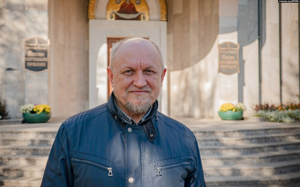
© Svaboda.org (RFE/RL)
Many people concerned about the impact of the proposed new Religion Law on freedom of religion or belief did not want to publicly criticise the new Law. “We don’t speak out with criticism publicly,” one individual told Forum 18 after the text of the draft Law was published, “as you could end up facing criminal responsibility.”
Human rights defender and Orthodox priest Fr Aleksandr Shramko – who now lives in Lithuania – regards the proposed new Law as part of the continuing regime crackdown on society. “It adopts new laws, corrects old ones – everything in order to somehow extinguish any pockets of not only possible resistance, but also any uncontrolled life,” he wrote on the Christian Vision website on 13 June. “All this looks somewhat absurd on the part of the authorities, which are ‘not living by the law’. But after all, animals also want to be like people, playing on the formal appearance of legality.”
Fr Shramko said that the regime’s religious policy “is characterised by a wary attitude towards religion and the desire to keep it in maximum isolation from society”.
Fr Shramko argued that new provisions in the proposed new Law “are mainly aimed at strengthening the strictness of these provisions and placing the activities of religious communities under the maximum control of the state, up to demands to conform to the regime’s ideology and policies”.
Local human Rights defenders continued to criticise the draft new Law. “The Lukashenko regime has also now increased control over religion,” the banned allegedly “extremist” Honest People human rights defenders group noted on 15 August. “An entire law was rewritten for this purpose.” The group said that, according to the draft text made public in June, the new version constitutes “total over-control, morphing into complete prohibitions and restrictions”.
The Baptist Union, Pentecostal Union, Full Gospel and Seventh-day Adventist Churches sent joint comments on the draft Law to the Plenipotentiary’s Office. “Apparently some of them were considered, the Head of Baptist Union Leonid Mikhovich told Forum 18 on 16 October. He added that only when the Law is finally adopted that they will be able to see if their comments were taken into account.
© Alyaksandra Shchyglinskaya/Catholic.by
Fr Yuri Sanko, spokesperson for the Catholic Bishops’ Conference, told Forum 18 on 17 October that “for our Church there is nothing to worry about regarding this law”. “We might have discomfort from total re-registration, but we don’t expect any difficulties.” He added that the Catholic Church hopes that the new Law would help to open more orphanages. “As far as I know, just one orphanage in Belarus functions in a convent.”
“We look at the new law with caution,” a Protestant pastor who asked not to be identified for fear of state reprisals told Forum 18 on 13 October. “It promises nothing good, but it depends on how formally it will be applied as the wording in some parts is obscure.” The pastor noted the “endlessly expanding” list of reasons the state could use to liquidate religious communities. “If desired, they may be applied to any religious organisation.”
The pastor noted that re-registration may be a problem especially for small countryside communities, for example in northern Belarus or the western Brest Region. “The number of believers is limited due to the small population.” The pastor expressed concern also about the great attention the Law pays to Sunday schools.
The Head of the Baptist Union, Leonid Mikhovich, said their “main concern” was the requirement to have 20 founders for registering a religious community. “In some villages we do not have the required number of people, while the law provides no other option other than to have 20 people to be allowed to hold regular worship meetings,” he told Forum 18 on 16 October. He noted that a similar requirement in the current Law “does not affect our churches”. He stressed that the final version of the Law is not yet known.
“Many of our communities will fail the state re-registration, mostly those in the countryside where there are not many people,” a member of the Religious Board of Muslims in Belarus, who asked not to be identified for fear of state reprisals, told Forum 18 on 17 October. “There is also a risk that our religious association, the Muftiate, will not have enough member communities for registration.”
A member of the Minsk community of the Church of Jesus Christ of Latter-day Saints (commonly known as the Mormons), who asked not to be identified for fear of state reprisals, also expressed concern about re-registration. “Some of our believers might feel uneasy to disclose their personal information, which is demanded at re-registration,” the individual told Forum 18 on 16 October. “Many communities rent buildings for worship, while others cannot find any and have to meet online.”
Draft Law reaches parliament
Following the 2 June publication of the draft Law, officials continued to revise it with no public consultation. Among the changes were the removal of: a ban on educational establishments having religious material in their libraries; a requirement that religious organisations would have to provide names of children and annual reports on their Sunday schools; and references to alleged “Nazism”.
The title of the draft Law was also changed to the Law “on amendments to laws on questions of the activity of religious organisations”. As well as including the text of the new Religion Law, the draft also includes amendments to the Civil Code.
The new Law was among six draft new Laws proposed by the government which were undergoing “corrections” before being presented to parliament, Natalya Kochanova, speaker of the upper chamber of the non-freely elected parliament, the Council of the Republic, told its opening autumn session on 19 September.
The draft Law was presented to the lower chamber of parliament, the House of Representatives, on 29 September, according to its website. The draft Law was assigned to the Human Rights, Ethnic Relations and the Media Commission, with deputy Lyudmila Zdorikova overseeing its adoption.
The text of the draft Law as presented to parliament was made public on the regime’s legal website on about 10 October. In an analysis on 11 October, the independent news website Zerkalo (working in exile as the regime has banned it as “extremist”) noted the new restrictions and requirement for all registered religious organisations to undergo re-registration.
“Earlier this year, all opposition parties were liquidated in this manner,” Zerkalo noted. “Apparently, having ‘cleaned up’ most spheres of public life, the authorities finally got round to religion and decided not to limit themselves to targeted measures like arresting ‘wrong’ priests, so now there will also be fewer churches.”
Draft Law approved in first reading
On 11 October, the House of Representatives approved the draft Law in its first reading, according to its website. No date has yet been set for the second reading.
“The draft law introduces new modern approaches to interaction of the state with religious organisations,” deputy Lyudmila Zdorikova claimed to state TV channel CTV.by on 11 October, after the first reading. “The draft has been worked out in close cooperation with religious leaders and the academic community. The draft was discussed publicly.”
Forum 18 asked Andrei Aryaev, Head of the Religious Department of the Plenipotentiary’s Office, on 12 October why it was necessary to change the Religion Law and whether the proposals from religious organisations were considered in the amended text. “I won’t give any comments,” he responded.
The Deputy Head of Minsk City Executive Committee’s Ideology, Religion, and Ethnic Affairs Coordination Department Yekaterina Kaverina put the phone down on 12 October before Forum 18 could ask a question.
Forum 18 reached Mariya Ignatenko, assistant to parliamentary deputy Zdorikova, on 13 October. She listened to the questions about the new Law without saying anything then put the phone down.


